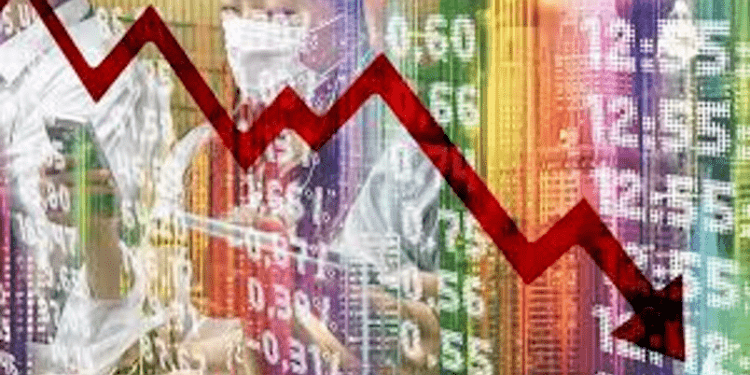| english | italiano |
Rete dei Comunisti
The situation which is determined by the globalisation of the covid-19 epidemic is not accidental, nor it is the effect of a conspiracy, but rather it is the direct product of a systemic crisis which in this years manifested in different ways and today present itself in the guise of a pandemic.
The epidemic is narrated in a distorted way by mainstream media, which continue to focus on secondary elements, such as whether this or that decision by the government is right, whether the timing of such decision was right, or on the extension of the ‘red’ zones, and on many other things on which all the so-called ‘politicians’ show their inconsistency, in the attempt to deviate the attention from the real causes which had produced over times these dramatic results which now manifest as a pandemic.
If we want to understand what is happening, we do not have to be distracted by the daily communicative drama, but we have to analyse the structural reasons of a situation which has an international dimension, and of which our country is only one corner. Moreover, we have to understand that the situation in which we find ourselves is the end point for a social system that after 30 years of ‘hegemony’ is damned to regress amplifying all the conditions which has generated.
What is emerging in fact is that the globalisation cannot be governed with a capitalist logic which now perpetuates itself as imperialism and competition.
The communist movement has always been internationalist – without confounding internationalism with the historical tendency of capital of the unification of the world market, as someone in the last decades might have thought. From this dimension of the problem the contradiction which is manifesting itself is the one, typically Marxist, between development of the productive forces and social relations of production. While we are told that we are arriving to Mars, and they explain to us the magnificent and progressive fate of our economic system, the reality at the social, environmental and the workplace level – in its global dimension – is progressively degrading and is entering in contradiction with the development that they impose on us, generating more and more ‘glitches’.
How to interpret, for instance, the claim of our ‘entrepreneurs’ of sending anyway workers to produce, risking their lives, without violating formally the guidelines given by the government, and generating a sense of fear, anger, and rebellion which can put in discussion the passivity of the world of work which the entrepreneurs themselves have pursued with obstinacy?
Another consideration can be helpful to interpret the current events.
In these years we always thought, maybe schematically, that the crisis of capitalism would manifest itself either as military conflicts or as financial crises, given the current autonomy of the monetary dynamics. What the coronavirus crisis is telling us is that the reality is always more complex of our reasonings and the crisis of hegemony, which we have identified since long time, is now getting its way even when our class enemies thought they had won the war and not only some battle.
The hegemony is imploding exactly on the generalised destruction of the Welfare State, which was conducted over the last decades also as historical vengeance of the global bourgeoisie of the class conflict in the XX century. In other words, it cannot exist a capitalist globalisation which does not produce damages and tragedies, and there cannot be no emancipation of humanity as a whole within this social model. History is not over.
Thus, to reiterate and take up some theoretical references is necessary to go to the heart of the matter, so that we can reconstruct the dynamics which are starting, and which will be amplified by the end of international health crisis.
It is necessary to be grounded in the concrete reality and start to draw some conclusions. First of all, we have to stress that the country where the pandemic started managed to put it under control by mobilising quickly an immense state apparatus in a way that only a state worthy of the name can do. We do not have the authority to define what is or is not socialism, but we can say that the public is the only one which is able to cope with social emergencies of this dimension. We also have to recall that Cuba, once again, showed to be at the vanguard not only of the medical science, but also of a clear social conception of the state.
This are hasty evaluations, but there is no doubt that these results are not only the product of the ‘efficiency’ of the state, but also of a cultural dimension of people where the collective is stronger than our devastatingly capitalist individualism.
The structural reasons behind our health crisis, in Europe and in the Western world, are now evident, even if the media continue to systematically remove them, as they know it would be a direct accusation act against the polices adopted by all governments.
The National Healthcare System in Italy has been hit by several cuts, amounting to 37 billion in only 10 years, it has been ‘reformed’ so that it could be privatised better, it has been reorganised towards the so-called ‘excellences’, and now it lost the capacity to be an instrument to defend public health.
This is the product of EU-led austerity policies, which did not only devastate the NHS, but the entire productive structure of our country. The fall of the bridge in Genova, and not only that, is the result of the lack of maintenance of the highway network, which has been given to manage to ‘enlightened’ private entrepreneurs such as the Benetton family.
Similarly, the frequent railway accidents in Italy are the products of a strategy which cuts the costs, such as maintenance costs – as it was showed by the derailment of a high speed train in the province of Lodi (and similarly in France) – and raise the tariffs, not for social aims, but to finance foreign direct investments of the railway company (formely public) Ferrovie dello Stato, which is now a multinational.
The long list of the devastating effect of the privatisation policies which has been triggered by the EU and supported by what we call the ‘cross-party pro-GDP coalition’ – from the Democratic Party to the Lega – might continue for a long time. The list of these effects goes from the ‘tariff capitalism’, where former industrial companies appropriated the running of public services, to the ongoing industrial crisis, which is the product of the absence of any state-led industrial policy and planning, which left freedom to rip and run to international financial funds.
What this unexpected international health crisis is showing is that we arrived here due to the dynamic of capital which, since the end of the USSR, found the best conditions to increase profit and power, affirming its ideology. Now there is no way back, for the very concrete reasons which are evident to those who want to see them.
The first reason is that the growth capacity to overcome the issues which the current crisis create is reduced and insufficient to give a general boost to the capitalist economy. As we know, for capital crises create also opportunities for recovery. But in this case the privatisation of public services which has been operated at a global level has been so generalised and deep that the current margins for recovery are extremely limited.
In other words, it has entered in a crisis the development of the tertiary sector, which has overcome as dimension the industrial sector in overproduction throughout the 1970s, offering to the private profit the public services and goods which have been obtained through the class conflict of the XIX century, which redirected resources and capital towards the social dimension.
The other element which does not make likely the possibility for a recovery is the level of organic composition of capital which as been reached at a global level. The level of automation of production and services reached such an extent from which it is not possible to go back. This means an intensification of exploitation and a worsening of the working condition of the labour force in a broad sense, which generates unemployment, precariousness and impedes the resocialisation of the wealth produced in absence of a strong class conflict.
Finally, the fight which arises from this reduced margins of profitability does not only have consequences for the working class, but also for the clash of powers at the international level, as it is becoming evident with the trade war, protectionist policies and the military conflicts pursued to affirm the geopolitical dominance of this or that imperialist power. Also the financial system, after the crisis of 2008, shows a difficulty in maintaining its function of stabilisation of the economy, as the recurrent monetary wars show.
To sum up, those who believe that the sanitary crisis might lead to a rethinking of policies towards social aims is wrong, as this situation is not the product of a ‘wrong’ choice, as the global dimension of the pandemic shows, but it is the result of a structural condition of capitalism, which after the thrill following the victory over socialism now has to deal with itself.
We know well that when this happens the perspective for humanity are not positive, as it happened in the past with the two world wars, and as it is happening today in new forms.
Unfortunately, the working class and the communists arrive at this point completely disarmed. This happens certainly because of the repression, as the class enemy is restricting more and more the freedom to fight and organise, but the reason behind this impotence goes beyond this.
The reason is also rooted in the material, political and cultural disintegration of our class, which has been favoured by those, such as the Italian ‘left’, in these decades of hegemony of capital accepted the idea that we have to abandon the revolutionary critique to capitalism; by those who have accepted the implicit and explicit values of the current organisation of society, by those who thought that they had to propose ‘reasonable’ alternatives, as socialism was now obsolete and not helpful at social and ideological level.
From accepting the dominance of the market over the state, sometimes in the form of ‘NGOs’, to the acquiescence towards social competition and ‘meritocracy’, there is only the capacity to imagine ourselves only within this horizon, which in Italy and Europe meant to support the policies of the European Union.
This way of thinking must be turned upside down. While fighting on the social and political front is important, it is insufficient without opening another front, that is the fight to recreate a system of values which breaks without compromises with the hegemonic culture and that opposes strongly the model in crisis. A model which denies any hope to a growing share of the population, starting from the young people, who do not see and do not have any prospect.
Today we have to rediscover in all its aspects the anticapitalistic and communist ideology, which as been turned into a ‘swear-word’ by those who imposed their cultural hegemony on society, but which is a tool that today is essential to give strength and identity to a larger and larger share of society to fight an hegemony which is increasingly showing its reactionary nature.
This is the concrete commitment which we have to give to ourselves while we overcome the coronavirus emergency, to open a new fighting front and to avoid that the period after the virus could look like the one before it.
12th March 2020

